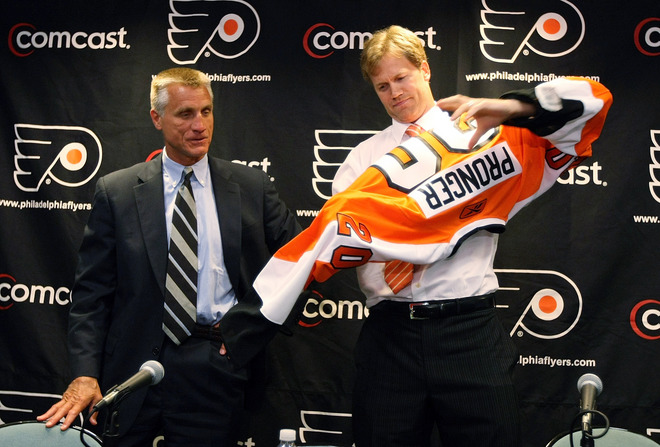In June, I wrote an article describing the future implications of the “decade deal” as I called it, on the National Hockey League. A player typically signs a deal longer than ten years for tens of millions of dollars. There are elements of risk and reward for each side. The team gets the player signed at a lower salary cap number than the player might have got on the open market, but a contract that long can sometimes weigh a team down (eg. the New York Islanders and Rick DiPietro). The player takes a little less money per year, but has the security of knowing that his contract is guaranteed for the long term, and if it is bought out, he still receives a significant portion of his salary.
Late last week, word surfaced that the NHL was probing the long-term deals that were signed by Chris Pronger and Marian Hossa shortly after the free agency period began on July 1st. Hossa signed a 12 year, $62.8 million contract with the Chicago Blackhawks, while Pronger signed a new 7 year, $34.9 million with the Philadelphia Flyers shortly after being traded from the Anaheim Ducks. Hossa’s cap number is just over $5 million per year and Pronger’s is just under $5 million. However, both players will earn the vast majority of their money in the first years of the deal. Under Hossa’s deal, he will earn just $3.5 total million in the final three years of the deal. Pronger will earn just $1.5 million total in the final two years of his deal. If not for those years, the players’ cap hits would be much higher.
The league is concerned that these types of deals violate the “spirit” of the Collective Bargaining Agreement. Since they will be earning far less money in the later years of the contract than the earlier years, it has been predicted that both players will choose to retire since they will have most of their money made. The league is investigating to determine whether this was considered by the teams before the deals were signed. If it is found that this was part of the negotiations, the Hawks and Flyers could face heavy fines and could possibly lose draft picks.
While it is unlikely that any stiff action will come out of the league’s investigation, it again raises the likelihood that this issue will be addressed in the next round of CBA negotiations. Gary Bettman has stated that he does not believe that these types of deals do not circumvent the salary cap, but all signs point to several heated discussions when the league and players’ association meet to begin negotiations within the next two years. It is up to the individual teams to determine how they spend their money, but if the league has its way, there will likely be one more restriction in place to limit spending and maintain parity.
